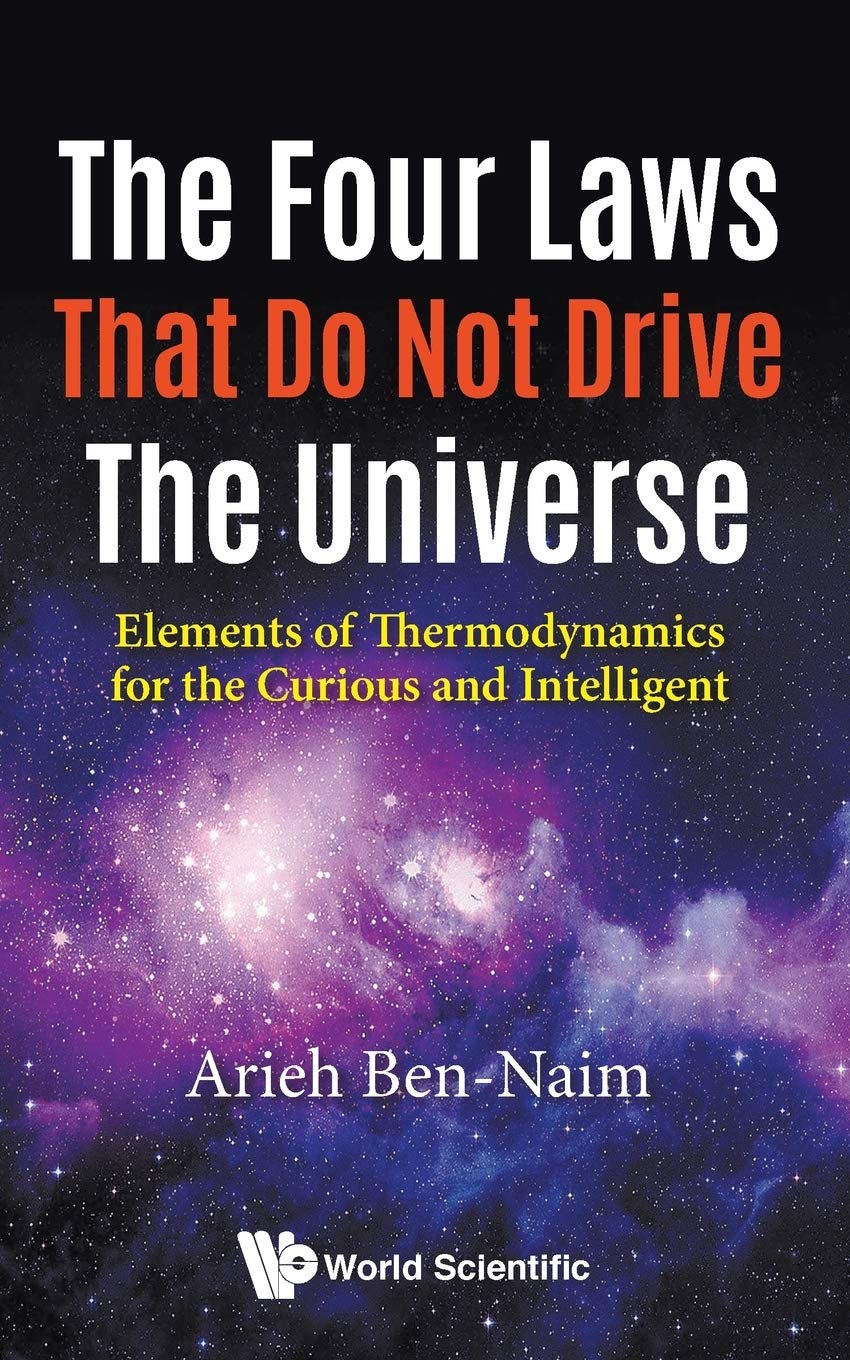

Four Laws That Do Not Drive The Universe, The: Elements Of Thermodynamics For The Curious And Intelligent
M**T
Stop blaiming entropy!
This is a well written, short book by a foremost authority of the science of thermodynamics. So many popular science book writers describe properties of our universe like they are near entities that run about causing chaos and wreak havoc for all of us. Nothing personal against any author but Ben-Naim beautifully points out in this book, the "laws" are in fact, quite passive, they are not waiting there to ponce on processes or drive processes or events. Rather processes and events proceed in accordance with the properties of the universe. Popular science books sensationalize natural conditions. After reading one of them, return to reality and read this book!
E**S
Not worth it
This is probably the worst thermodynamics book I read. The author objective seems to be just to play down Atkins' book. It does not offer any insight on the subject and create even more confusion. Moreover, the only reason he offers to oppose the idea that entropy of the universe increase is that entropy is only define for equilibrium states, which is not true, it can be defined locally. He says that entropy is not a function of time, which is clearly wrong even for quasi-static systems. The explanation for Helmholtz and Gibbs energy is completely obscure.
K**.
4 Laws or 2 Laws
The 4 Laws of Thermodynamics1. You Must Play the Game.2. You cannot Win.3. At Best You can only break even.4. You can't Quit the Game.Or, reduced to Two Laws1. You can't get Something for Nothing.2. There's No Free Lunch.
J**O
I would like to remark that in the case of the second ...
In this small book, written by a highly reputed author, whose contributions to thermodynamics are well-known by the experts, the basic pillars upholding thermodynamics are analyzed in some detail, using an accessible language for the lay reader. The author claims, I think rightly, that some of the popular science books (sometimes even textbooks!) try to smooth the way for understanding scientific concepts by loosing rigor in the statements employed. This is really very dangerous because in the end, confusion occupies the place of ignorance, which is totally unacceptable.I would like to remark that in the case of the second law of thermodynamics, Professor Arieh Ben-Naim introduces a non-conventional formulation, based on Shannon’s information theory. As the author stresses, this new view helps grasping the meaning of the second law, avoiding misunderstandings commonly associated to the conventional entropy formulation.If you need to strengthen your knowledge concerning thermodynamics, this book will be of great help.
W**R
Straight-shooting author offers a clear picture
Once again, Professor Ben Naim, emeritis of Jerusalem University is proving careful science readers with a reward.Too often, authors tend to confuse the proper relation of entropy and information and even get confused aboutinformation itself.The trouble with some authors is that they don't realize entropy is more or less a "passive" or descriptive quantity,and its not so straightforward to claim that it pushes or drives anything.Professor Ben-Naim has the simple desire to get to the truth, and he does his best to share thiswith the readers.
A**R
Logical and unbiased approach to simplify the enigmatic topics.
Prof. Naim’s book, “The Four Laws That Do Not Drive The Universe”, scientifically reviews and refutes the interpretation of these laws of thermodynamics in Prof.Atkin’s book ( Four Laws That Drive The Universe) and lives to the expectation of curious and inquisitive readers. The book lucidly explains that four laws like any other laws of thermodynamics are normal and as such do not drive the universe.The chapter on the Second Law and entropy is the longest which is justified. It is unfortunate that the otherwise innocuous topics like Entropy and theSecond Law are made mysterious and hazy, and misinterpreted by many renowned authors of books on popular science and thermodynamics. Most of the authors describe entropy as the power to drive all the processes in the universe, a measure of disorder or quality of energy. The futility of such claims is explained in easy to understand language. The emphasis given to probability and Shannon’s Measure of Information to clarify entropy and the Second Law is important. The author rightly suggests replacing entropy with probability in the formulation of the Second Law. The related topics like Helmholtz energy, Gibbs energy, and various formulation of the Second Law are also covered for better understanding.The book will prove very insightful and also an eye-opener to engineers and avid readers of literature on popular science.
M**Y
A rebuttal
A great subject, this rebuttal has left me even more uncertain
Trustpilot
3 weeks ago
1 month ago